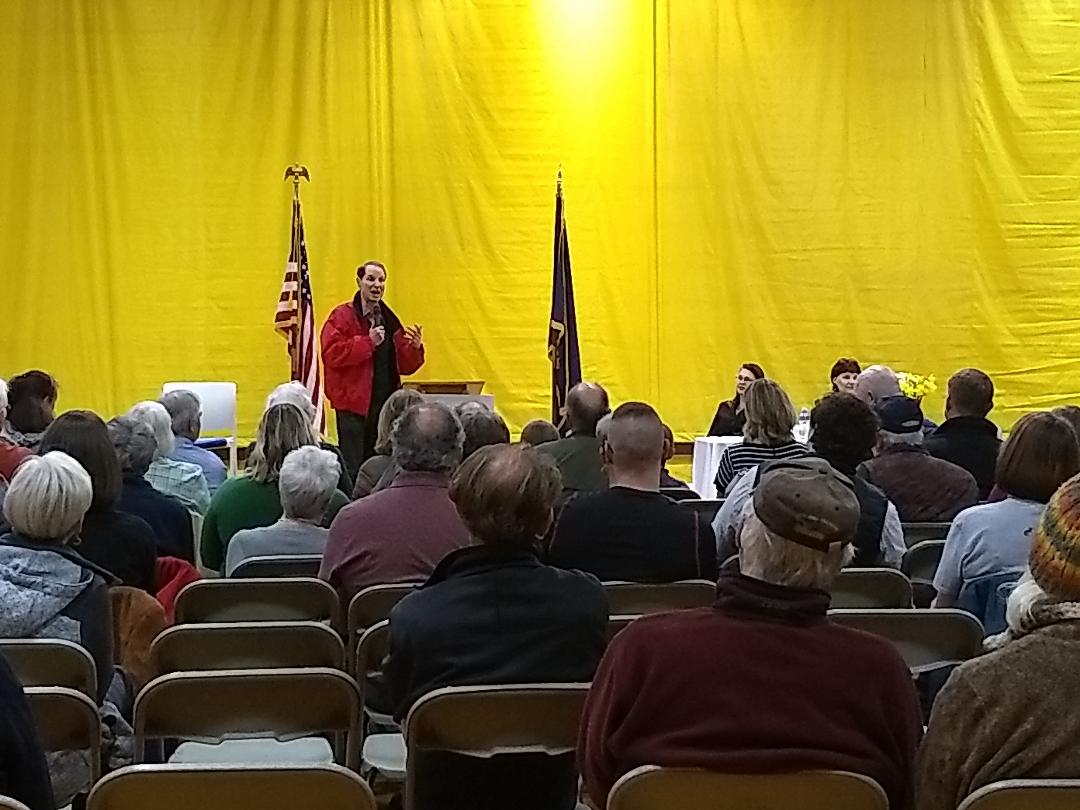Gun control and mental health were the dominant topics raised by local citizens during a town hall meeting held by Sen. Ron Wyden at Linn-Benton Community College on March 17.
About 175 people attended, and those who wanted to ask questions received a numbered ticket when they signed in and were called at random.
Wyden said he supports research into gun violence and the banning of “bump stocks.”
Things are starting to change and the people who are most responsible for that change are high school students, he said.
He mentioned the recent national walkout and student-led protests in response to the school shooting in Parkland, Fla. in which 17 people died.
Real change doesn’t start in Washington, D.C. or Salem, he said.
In a conversation after the town hall, Wyden said he wants to pass legislation that will “keep guns out of the hands of people who shouldn’t have them.”
“The Florida legislature didn’t go as far as I would have gone as far as I would have gone in terms of things like background checks,” Wyden said. “They’re getting sued by the NRA. The idea that the Florida government is getting sued by the NRA, I never would have believed that three or four years ago.”
Wyden said he advocates for research into the causes of gun violence.
“A Republican appropriations rider first authorized by then-Congressman Jay Dickey, R-Ark., in 1996, prohibits the Centers for Disease Control and Prevention from using federal funds to advocate or promote gun control,” he said in a March 15 news release. “Some have misconstrued this rider as a ban on CDC research into the causes of gun violence.”
In 2015, Dickey and Mark Rosenberg, who was director of the National Center for Injury Prevention and Control at the Centers for Disease Control and Prevention from 1994 to 1999, co-authored an opinion piece for The Washington Post.
“Our nation does not have to choose between reducing gun-violence injuries and safeguarding gun ownership,” they said in the opinion, citing how research helped lower the motor vehicle-related deaths.
Wyden said he wants to remove barriers to researching gun violence.
“I want to lift the restriction,” he said. “I want to give scientists the freedom to do what scientists do. We need to look at underlying considerations behind this incredible rash of school shootings and gun violence.”
Wyden said he has talked to gun store owners around the state.
“They tell you, ‘We know who some of the people are who shouldn’t have guns in town,’” he said. “Let’s try using that. This is not the sole answer. If you’re looking at trying to think through practical steps. Why not use people who really know something about this?”
An LBCC student, who said told the crowd he has been diagnosed with OCD and depression, expressed concerns about what he perceives as a “lock ’em up” mentality regarding people with mental health issues.
“Mental health issues are pretty personal to the Wyden family,” Wyden replied. “My brother was schizophrenic. Not a day went by when we weren’t worried about him being on the street and that either he was going to hurt himself or he was going to hurt someone else.”
Wyden’s father, Peter Wyden, wrote “Conquering Schizophrenia,” a book about their journey.
“There are two things that are especially important right now,” Wyden said.
The first is that a majority of mental health resources are paid for through Medicaid, he said.
“This administration is really trying to hollow out the Medicaid program,” he said. “I want you to know that as long as I am the senior Democrat on the Senate Finance Committee, no one is going to hollow out the Medicaid program. It’s safe for now.”
The second issue is parity between mental and physical health, he said.
“Years ago, a law was passed that was supposed to bring about parity between mental and physical health,” Wyden said. “Practically, as soon as the ink was dry on the law, the insurance (companies) started trying to go around it.”
Wyden also discussed recent changes in trade policies by the Trump Administration.
A Corvallis furniture maker said at the meeting that plywood tariffs are harming his business.
Material costs have gone up 30 to 100 percent, he said.
“(There is) unfair competition from foreign companies shipping in furniture that can still buy materials at half the price we do,” he said.
Wyden said competition is important.
“Sometimes people ask me my position on trade,” Wyden said. “Let’s grow it in Oregon. Let’s make it in Oregon. Let’s add value to it in Oregon, and then let’s ship it somewhere. That’s my position on trade.”
He said the problem is that two countries in particular, China and Canada, have not treated the industry fairly – either through heavy subsidies or through “out and out cheating.”
“You’ve got to enforce the laws so people with subsidies don’t undercut the market,” he added.
Wyden’s staff spoke with the business owner after the town hall and are working with their Washington D.C. office to follow up on his concerns, a spokesman said.





